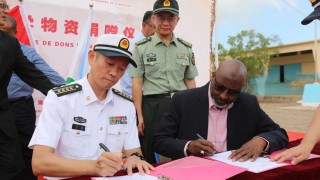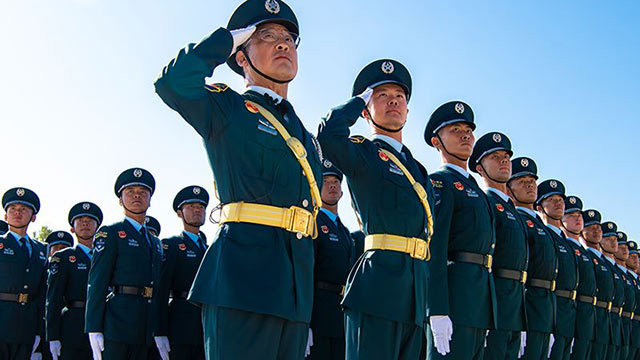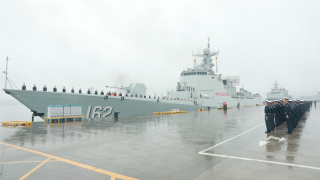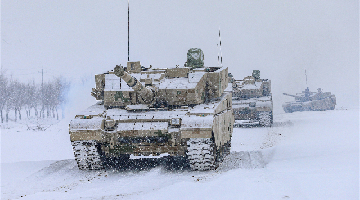By Jia Pingfan
The Japanese Ministry of Defense recently announced that it plans to build 130 new munitions depots on the islands in the southwest of Japan. The Japan Maritime Self-Defense Force will increase the number of Aegis ships from the current eight to ten. Japan has ignored the historical pain it brought to countries in the Asia-Pacific region, continued to break through the bottom line, and gone further and further down the road of military expansion. Japan is seriously threatening peace and stability in the Asia-Pacific region.
Japan has continued to increase military spending. According to the defense budget application completed by the Japanese government in 2022, its military budget in Fiscal Year 2023 will exceed six trillion yen (US$45 billion) for the first time, accounting for more than one percent of its GDP, and increase to two percent within five years. According to the rankings of international organizations such as the Global Firepower Index in 2022, the overall strength of the Japanese Self-Defense Forces (JSDF) ranks fifth in the world. With the doubling of defense spending in the next five years, Japan's military expenditure will also rise from the current ninth place in the world to the third. The new changes in Japan's military power have made the outside world worry about Japan's future direction.
Japan has abandoned the exclusively defense-oriented strategy. In December 2022, Japan officially adopted three security policy documents including the National Security Strategy (NSS), National Defense Program Guidelines (NDPG) and Medium-Term Defense Program (MTDP), proposing that Japan will be committed to "counterstrike capability" and other policy propositions. Based on the main content of the three documents, Japan's security concept and defense policy in the next five to ten years will undergo a major turning point since the end of World War II. In particular, Japan will completely abandon the exclusively defense-oriented strategy, which has been Japan's core defense concept after the war. This is a dangerous departure from the Peace Constitution. As we all know, the reason why Japan's current constitution is called the Peace Constitution lies in the fact that its Article 9 clearly stipulates: "Aspiring sincerely to an international peace based on justice and order, the Japanese people forever renounce war as a sovereign right of the nation and the threat or use of force as means of settling international disputes. In order to accomplish the aim of the preceding paragraph, land, sea, and air forces, as well as other war potential, will never be sustained. The right of belligerency of the state will not be recognized."Compared with the Peace Constitution, it is not difficult to find that these three documents have taken unprecedented steps in military breakthroughs.
Japan has actively engaged in camp confrontation. Japanese Prime Minister Fumio Kishida successively visited five countries in the Group of Seven (G7): France, Italy, the UK, Canada, and the US from January 9 to 142023. In the meanwhile, Fumio Kishida made a big fuss about security and defense cooperation in every country he visited. He established a consultation mechanism between the foreign and defense departments of Japan and Italy. He signed the Reciprocal Access Agreement (RAA) with the UK, allowing the UK to deploy troops in Japan. He finalized the action list of Japan and the US to further deepen the security alliance. In addition, Japan has been acting as the vanguard of the US's Indo-Pacific Strategy and has been trying to bring NATO's power to the Asia-Pacific.
Japan's above-mentioned dangerous actions run counter to its post-World War II development idea of focusing on the economy, not the military. In order to cover up its political and military ambitions, Japan has been finding excuses for constitutional amendments and military expansion in recent years, and frequently blaming its neighbors. Japan has been making small moves on the Taiwan question, cheering for the "Taiwan independence" forces openly and secretly, following closely the footsteps of the US's Indo-Pacific Strategy, participating in joint military exercises with the US in the South China Sea many times, and deliberately provoking regional conflicts.
Japan should be aware that it will always stay in East Asia, and its future cannot be separated from regional security, stability, and prosperity. If Japan does not deeply reflect on its history of aggression, does not respect the security concerns of its Asian neighbors, and does not consider the development environment of regional countries, it is impossible for Japan to win the trust of its neighbors and the international community, and this will inevitably hurt Japan.
Editor's note: Originally published on haiwainet.cn, this article is translated from Chinese into English and edited by the China Military Online. The information and opinions in this article do not necessarily reflect the views of eng.chinamil.com.cn.











